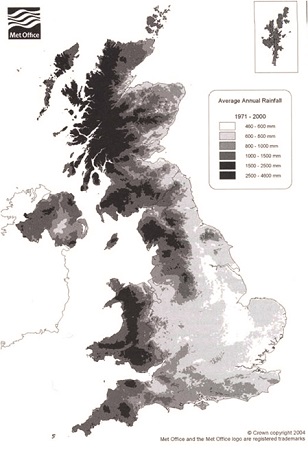We have a fixed amount of water on the planet so we are not going to run out. However, each time we ‘clean’ used water we use energy, so we need to manage our water use effectively.
For some uses, such as flushing toilets, we do not need to use drinking water – rain water will do the job very well.
In the UK, we have areas of water stress. This is when the parts of the country with the most rain are the least populated.
Met Office map showing water stress levels in the UK
There are simple ways to use less water such as:
- Low flush or dual flush toilets
- Flow restrictors on taps
- Low flow shower heads
You can also reduce your reliance on processed mains water through harvesting or recycling existing water supplies.
- Greywater recycling is the use of waste water from baths, showers and hand basins for toilet flushing, irrigation or washing machine supply.
- Rainwater harvesting is the collection of rainwater from roofs or hard standings for use for toilet flushing, laundry water supply or irrigation.
You could also change your behaviour by:
- showering rather than having a bath
- turning off the taps when you don’t need running water.
You can find out more about water saving opportunities and can often get free gadgets from water utility companies such as Wessex Water and Bristol Water.

